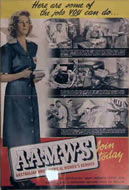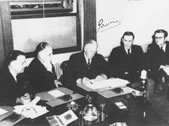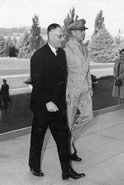

Decision to immediately enlist an effective infantry division of 20 000 men who would be required to serve at home and abroad with preference given to single men 20-45 years, not otherwise engaged in essential work. 1

Urgent issue of underwear for the rapidly expanding Australian Army. Norman Myer, a Melbourne merchandiser supplied sealed samples of men’s underwear for consideration and approval by the Australian War Cabinet. After 'careful examination and considerable discussion' approval was given for cotton underwear to be issued to cover the first three months of 1940. Approval was deferred for an issue of winter woollen underwear, indicating that there still may have been hopes for an early peace. 2
Announcement of the Empire Air Training Scheme in which the RAAF would train 10 400 pilots and 15 600 observers, wireless operators and gunners. 3
Approval for compulsory military training for defence
of Australia to commence January 1940. 4

War Cabinet expressed its view on the importance of establishing an Australian Legation at Tokyo before the international situation deteriorated further to the disadvantage of the British Empire. 5

Approval given for the formation of Australian Women’s Army Service which would release men for other employment and overseas service. 6
War Cabinet minute of 10 October 1939 detailing
Australia's contribution to the Empire Air Defence - Training of Personnel.
National Archives of Australia: A5954, 803/1
Recruitment pamphlet 'AAMWS - Join today' for the
Australian Army Women's Service
National Archives of Australia: C934/P1, Folder 7

Declaration of war on Japan - The War Cabinet minutes state: 'Note was taken of the following Admiralty message dated 8 Dec: Commence hostilities against Japan, repetition, Japan at once.' 7 Governor General Lord Gowrie and John Curtin signed the proclamation of war with Japan in the War Cabinet room that day.
Discussions in the War Cabinet regarding the defence of Singapore when Shedden was
very disappointed with the showing of the Chiefs of Staff at this morning’s War Cabinet meeting. The information they had to present as to preparedness for this emergency was, I thought, scrappy and meagre, and I almost gathered the impression that this new and nearby threat to Australia was merely another incident in the present war in which we had added to our enemies by one, though, of course, we had gained another ally. I think the Government must press it right home that this is a new war which entails an entire review of our position and the extent and direction of our efforts.
Shedden attached a draft letter from Curtin to himself directing him to provide appreciations from the Chiefs of Staff. Curtin agreed and the Chiefs were so ordered. 8
Due to the war in the Pacific a decision was made to increase the number of men under arms in Australia. Particularly targeted were single men and widowers without children, aged from 18 to 35 years. The Volunteer Defence Force undertook aerodrome defence and coast watch duties. State Governments were given the power to enforce air raid precautions and blackouts and holidays and shopping hours were curtailed. 9
Mid- week sport was to cease, and daylight saving commenced in January 1942 10
Governor General Lord Gowrie signing the Declaration
of War on Japan, watched by Prime Minister Curtin and members of his Cabinet.
John Curtin Prime Ministerial Library. Records of the J S Battye Library
of West Australian History. G-G Lord Gowrie signing Declaration of War
on Japan. JCPML00139/57. Original held by J S Battye Library of Western
Australian History: BA499/57, 53469P
'Defence of Australia and adjacent areas - Appreciation
by Chiefs of Staff' presented to War Cabinet, 11 December 1941.
National Archives of Australia: A5954, 555/10

War Cabinet announced government control of the economy and of Australia’s commercial and industrial structure in an effort to rally national resources behind the war effort. A decision which interfered drastically with the private lives and civil liberties of the population. 11
Decision to recall Australian divisions from the Middle East. 12

General MacArthur arrives in Darwin, and subsequently attends meetings of Advisory War Council. 13
War Cabinet approves the re-organization of Australian
land defences recommended by General Blamey, Commander in Chief of the
Allied Land Forces, South West Pacific Area. 14
John Curtin and General Douglas MacArthur, Canberra,
1942
John Curtin Prime Ministerial Library. Records of the Curtin Family. Prime
Minister John Curtin and General Douglas MacArthur, Canberra 1942. JCPML00376/114

Austerity measures announced after discussion in War Cabinet and Advisory War Council. These included: restricting racing, reduction of sports reporting in newspapers and on radio, entertainments tax. There was also to be liquor control with taxes increased on beer, spirits, cigarettes and playing cards. Menus at public eating places were restricted to three courses, and severe penalties were instituted for black marketing. 15

Decision to release 40 000 men from services and munitions production by June 1943, to meet the needs of food production and other indirect support for the war. This decision indicated a shift in relationship between War Cabinet and Defence Committee as the War Cabinet was taking a more detailed and critical control of the direction of the war effort. 16

With the war in Europe ending officially on 8 May 1945, the War Cabinet approved an additional release of men from the armed forces and decided to reduce operational strength of the Army and Air Force. 17
'New Clothes from Old' - Commonwealth Rationing
Commission booklet.
John Curtin Prime Ministerial Library. Records of the John Curtin Prime
Ministerial Library. New Clothes from Old, booklet, n.d. JCPML00715/6
s.jpg)


s.jpg)

